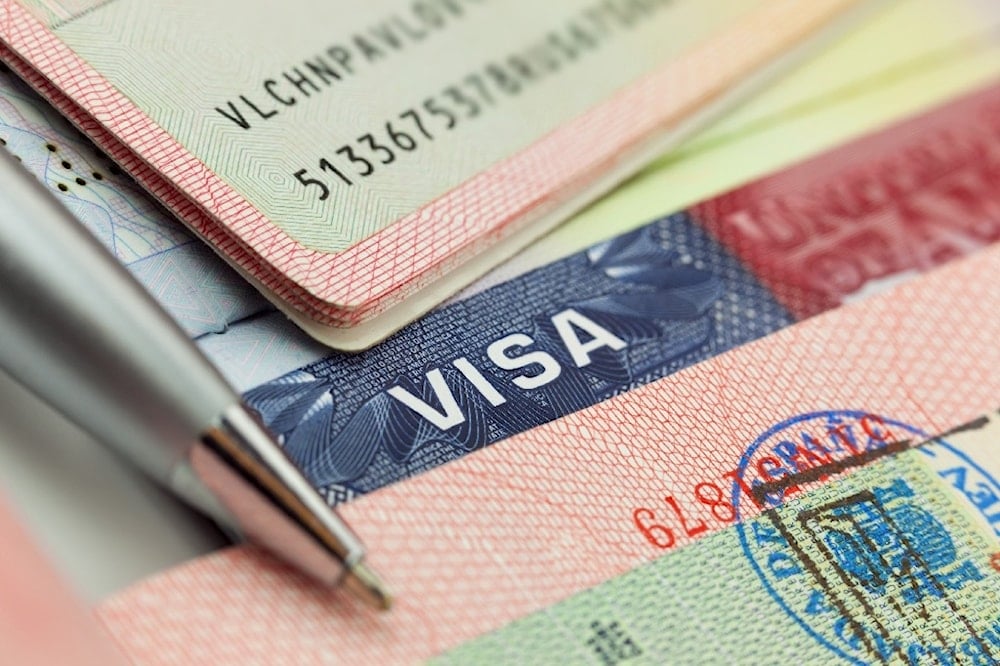Americans race for EU residency as immigration doors begin to close
Americans are racing to secure European visas as countries tighten rules on citizenship, golden visas, and work permits amid rising political uncertainty in the US.
-

A stamp on an EU VISA appears by a pen in this undated photo. (AP/European Union-EP)
As immigration laws tighten across Europe, a growing number of Americans are scrambling to secure second passports, digital nomad permits, or investor visas, seeking a way out amid deepening political uncertainty at home.
Once seen as a “Plan B,” European residency has now become a top priority for many Americans who were once concerned about the consequences of another Donald Trump presidency, before he was elected, the erosion of federal protections, and rising social and economic instability in the US.
But even as demand surges, governments across Europe are moving to restrict access to the very channels that once made such relocations relatively easy, from ancestry-based citizenship to golden visa schemes.
Countries with large diasporas, such as Italy and Ireland, have traditionally welcomed applicants able to trace their roots back a generation or two. But that is changing; Italy recently passed an emergency decree restricting eligibility for citizenship-by-descent to those with parents or grandparents born in the country, scrapping more flexible ancestry-based pathways that once dated back to 1861.
Ireland is still issuing citizenship to applicants with Irish-born grandparents, but experts say the window may not remain open for long.
“People are really worried, they have this sense of urgency to have citizenship,” said Kelly Cordes, founder of Irish Citizenship Consultants, who is now filing up to 25 applications a week for US clients, double last year’s pace.
Golden visas and investor options dwindle
One of the most popular tools for wealthy Americans, the golden visa, is also being dismantled across much of Europe. Spain recently abolished the scheme, joining the UK, which scrapped its own version in 2022. Portugal and Greece have introduced stricter conditions on real estate and investment thresholds. In April, the EU’s Court of Justice ruled that Malta’s golden passport program was illegal, casting further doubt on the future of investment-based migration in the bloc.
Still, demand persists. Samantha Wilson, who runs Smart Move Italy, said interest in investor, digital nomad, and retiree visas has tripled in early 2025, with many Americans urgently trying to secure residency before rules change again.
With traditional routes narrowing, some Americans are pivoting to remote work-friendly or academic channels. Data from global HR firm Deel shows a 16% increase in the number of Americans hired by European companies between January and April. Job searches for Ireland and Portugal have surged on platforms like Glassdoor.
European universities and research institutes are also actively recruiting US-based scientists and scholars who face potential federal funding cuts, offering academic residency paths or temporary work permits.
Others are turning to digital nomad visas, which became widely available during the pandemic and offer tax incentives and temporary residence for remote workers.
“We want to exit,” said Jacqueline Ballone, a 43-year-old from Oregon who is applying to work remotely from Umbria, Italy, to be near her aging parents. “I’m at my maximum capacity of witnessing this,” she said, referencing growing safety concerns, including the presence of far-right groups in her neighborhood.
Retirees weigh relocation amid domestic instability
Retirement-focused visas, often offered by countries in exchange for proof of stable income, are gaining traction too. Heather McLean, a 50-year-old retired police officer from Minnesota, and her husband are preparing to apply for a retiree visa in France or Spain, citing rising anxiety over economic and political instability in the US.
“It’s a dramatic change for us,” McLean said. “We had no intention of pulling our son out of school or uprooting our family. But things are dramatically different now than they were six months ago.”
Many of those considering relocation say they were once casually exploring backup options. But recent developments, from political polarization to court decisions, environmental anxiety, and social unrest, have pushed what was once hypothetical into urgent action.

 4 Min Read
4 Min Read










